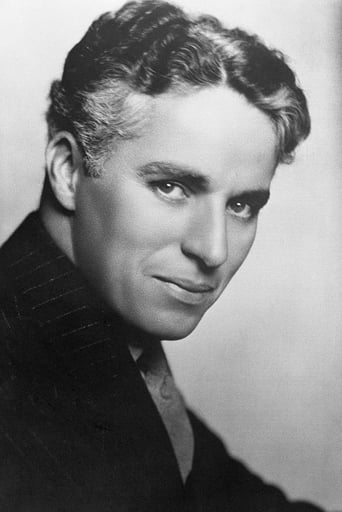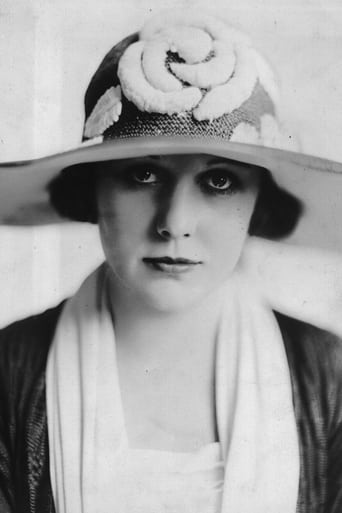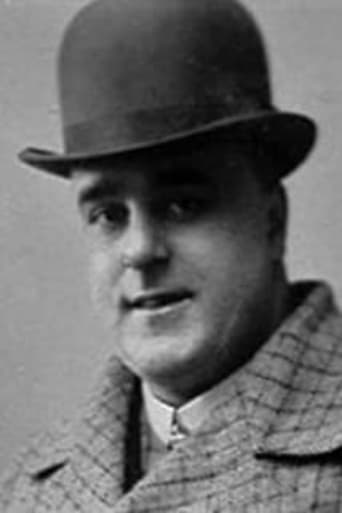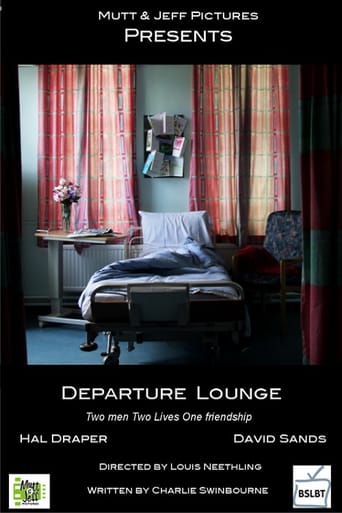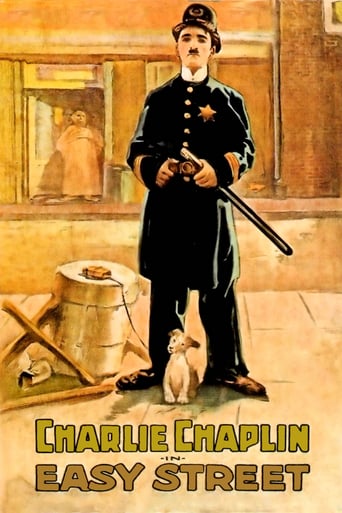
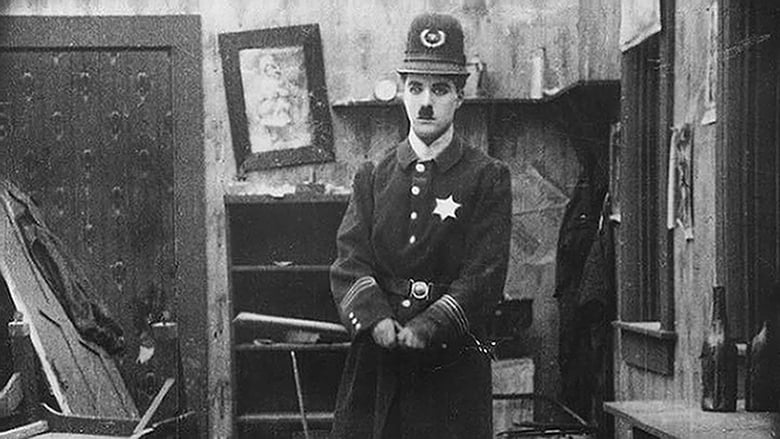
Easy Street (1917)
A derelict, huddled under the steps of a missionary church, feels enlightened by the sermon of a passionate preacher and infatuated by the beauty of the congregation's pianist, in such a way that he tries to improve his life of poverty by becoming a policeman. His first assignment will be to patrol along Easy Street, the turf of a vicious bully and his criminal gang.
Watch Trailer
Cast
Similar titles
Reviews
Purely Joyful Movie!
Yo, there's no way for me to review this film without saying, take your *insert ethnicity + "ass" here* to see this film,like now. You have to see it in order to know what you're really messing with.
Although I seem to have had higher expectations than I thought, the movie is super entertaining.
Watching it is like watching the spectacle of a class clown at their best: you laugh at their jokes, instigate their defiance, and "ooooh" when they get in trouble.
Hilarious short film from Charlie Chaplin. The spectator is pleased with extremely funny action and with a nice use of space on screen, in a quite accelerated pace. Inner city Easy Street is almost a character itself, in constant movement, place of violence, brawl, robbery, poverty, hunger, drug usage... Just like the trump himself and also like his antagonist, big bad Eric the tough (great job of Eric Campbell too!), the street may change its character. Religion appears as the great channel for change in the film, which is a bit moralist, but at least does not put moral judgement above needs. The tramp is too little for fighting a so dire challenge as troubled Easy Street, isn't he? Well, perhaps he is smart enough. Maybe this is the best of all Chaplin's short films and his best movie from the 10's.
This is as complete a 2 reeler (each reel was about 10 minutes in the old days) as you can get in a silent film. Charlie Chaplin is really in character & in stride in this movie. The setting of the plot in the mission & on a poor neighborhood street is drawn from Chaplin's own childhood. The bully was too, although he was probably a composite of those who mistreated Chaplin as a child. The tramp becoming a hero is no better done than in this story.The film not only has excellent comedy, but manages to pull a little on the heart strings without getting too emotional. Edna Purviance provides an excellent female lead. Eric Campbell plays the giant bully very well too. Charlie is in great form too. If your into checking out 2 reel comedies,I highly recommend this film. This is one that made 2 reeler's an art form during this era of silent films.
I've been a Chaplin fan since I was in grade school, and Easy Street was the movie that converted me for keeps. It wasn't the first of his films I saw, but once I'd seen it I knew that Charlie Chaplin was truly as great as his reputation proclaimed. He's wonderful here, at the peak of his powers, funny and moving and seemingly super-human, like some kind of cartoon dynamo. And today, more than 30 years since I first encountered it (and almost 90 years since it was made!) this is a film I could watch again anytime, not just because it's funny -- although it is -- but also for darker, more melancholy reasons. Easy Street is certainly a comedy, but it's no one's idea of a light-hearted romp: the humor in this story is rooted in poverty, violence and substance abuse, and unfortunately all of these things are just as relevant today as they were in 1917. It's well known that Chaplin grew up in dire poverty, and it's reasonable to assume that the squalid world of this ironically titled work is based on his childhood memories. This film stands as proof that the greatest comedy is born out of pain, and that's why I can return to it again and again, for although human suffering is always topical and always relevant, so is the urge to transcend suffering through humor. In this film Chaplin triumphs over the deprivations of his own childhood, and viewers can share in his triumph.In the opening scene we find Charlie fallen on hard times, no longer the dapper Gentleman Tramp of earlier appearances but a real derelict, ragged, pale, and sleeping on the ground. He is drawn to a nearby mission by the sound of singing, joins the congregation and soon pledges to go straight; he even proves his conversion is genuine by pulling the collection box from his baggy pants and returning it to the startled minister. Before long Charlie has applied for the job of police officer in the roughest neighborhood imaginable, Easy Street, a slum ruled by an enormous bully, magnificently portrayed by actor Eric Campbell. The unfortunate Mr. Campbell, who would be killed in a car accident less than a year after giving this performance, deserves a belated nod of respect for making Easy Street such a memorable experience. Although clearly intended as a comic caricature, Campbell's nameless bully is nonetheless a formidable figure, a mighty beast with a shaved head and heavy eyebrows, and the close-ups that reveal Campbell's stage makeup do nothing to diminish his powerful aura.The film's most unforgettable sequence comes when Officer Charlie, dressed in a Keystone Cop style uniform as he nervously walks his beat for the first time, suddenly comes face-to-face with Campbell, an ogre several times his size. The scene is filmed in a single lengthy take, beginning with a tracking shot as Charlie strolls down the sidewalk, encounters the bully, and then tries to stand up to him. The bully, who appears to be made of granite, becomes increasingly sure of himself as Charlie falters. When Charlie finally resorts to clubbing him over the head, the blows have no effect whatever; in fact, the bully impassively offers his head for more clubbing, just to demonstrate how little it bothers him. Charlie tries to flee, but the bully yanks him back and starts toying with him, like a cat tormenting a mouse before moving in for the kill. Scary, right? Well it's funny in the movie, but scary too, and it comes as a relief when Charlie (in an iconic moment as familiar as Harold Lloyd dangling from the clock) resourcefully uses a nearby gas lamp to subdue the bully -- temporarily, anyway.While the scenes with Campbell are moments to savor, there are also a number of low-key sequences involving the lady from the mission, played by Chaplin's perennial leading lady Edna Purviance, and during these scenes we get a vivid picture of life on Easy Street. Edna takes Charlie to a flat full of kids whose exhausted-looking parents obviously can't cope. Charlie, impressed with the scrawny Dad's ability to father so many children, quietly pins his own badge on the man's chest. It's a sadly funny moment, but the larger picture is bleak, and before the story is over we've been presented with images of domestic abuse and drug addiction. None of this material is prettified or sentimentalized in the "Hollywood" manner; this looks more like newsreel footage, and some viewers may well find it depressing. Easy Street is no stroll in the park, but somehow Chaplin is able to leave us on a note of hope, even while making it clear (with one last gag involving the reformed bully and his wife) that he's fully aware of the wishful thinking involved. Still, it's a beautiful ending to a great movie, one that demonstrates Chaplin's artistry as beautifully as any short film he ever made.
Easy Street starts with Charlie with as a poor, destitute tramp. After attending a storefront revival service, and meeting the always delightful Edna Purviance, he decides to turn his life around. He quickly gets a job as a policeman and he finds himself assigned to Easy Street, the worst neighborhood in the city ruled by tough Eric Campbell. Using his own unorthodox tactics, Charlie eventually subdues Eric and neighborhood and they all live happily ever after.Easy Street was one of the twelve films Chaplin made for Mutual. Mutual gave Chaplin unprecedented freedom and responded by giving them, overall, twelve of the best comedy shorts ever made. Easy Street is easily the best of them. It is a very funny short. This is the film I show when I want to introduce someone to Chaplin or silent films in general. The gags are inventive, and they are extremely well-played by his regular company of Mutual performers. Chaplin himself is at his best in this film, but where would he be without Eric Campbell, the best heavy he ever played against. (Sadly, Campbell would die in a car accident after the completion of the Mutual comedies. His loss would be felt in the First National comedies, which rarely reached the heights of the best Mutual work.)But there is more to Easy Street than laughs. It is unusually mature for a silent comedy of its period. Chaplin usually presented his tramp character as a happy-go-lucky figure - a vagabond by choice, not circumstance. This film starts with the tramp as a down-and-out character, much in need of the new beginning he gets at the mission. In perhaps his first attempt at social commentary, Chaplin provides an unblinking view of ills of the society of the time. The most graphic example is the drug addict shooting up with a needle. People often have a misconception of silent comedies being simply quaint. That isn't quaint. This is a must see.
